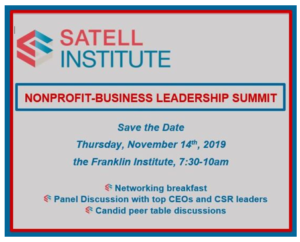When John Weidenhammer founded the technology company that bears his name in 1978, he was well aware of the importance of CSR. “Paul Rodale, the CEO of Carpenter Technology, my first job, instilled in me the importance of giving back to the communities where we live and work. He taught me that corporate giving builds the fabric of the community and creates a rising tide that lifts all boats. I never forgot his words, and CSR is and always will be a critical part of our culture.”
Nationally recognized
Weidenhammer is a nationally recognized technology company with 200 IT professionals in seven locations. In addition to being a major contributor to CSR, John Weidenhammer has a history of volunteering, serving as Vice Chairman, Reading Health System; Trustee, The Wyomissing Foundation; Trustee, Albright College; Trustee, Berks Business Educational Coalition and as a board member of the Foundation for the Reading Area Community College
John, can you talk about how you view CSR?
I have been involved in corporate giving since my first job. I am not alone in that many companies have always contributed to the support of their communities. So I don’t see CSR as a new development. I do think the Satell Institute has come up with a revolutionary aspect of CSR that is having a positive effect in greater Pennsylvania.
Can you elaborate on that?
It starts with the requirement for membership. Members agree to contribute at least $25,000 a year for four years to a nonprofit of their choice. This commitment allows nonprofits to do long-range planning, something they were unable to do with the standard one-year contribution. There are no fees or initiation costs. SI overhead costs are fully funded by its founder, Ed Satell, so all our contribution goes to the nonprofits we chose.
What changes have you seen in CSR?
I think companies are beginning to realize they can track the positive results of CSR in areas such as recruitment, marketing and customer retention. Employees like to know their company does more than give lip service to help the communities where they live and work. Customers also recognize companies that help to improve health care, education, child-care, mental health and culture in their communities. So there is an ROI in CSR that goes beyond good feelings about philanthropy.
How did you learn about SI?
I heard about SI through Doug Tieman, president of the Caron Foundation, an organization specializing in substance abuse recovery and treatment. Doug had very positive things to say about SI. I knew when I attended the first meeting that this was an association I wanted to join. To be involved with people who felt as dedicated to CSR as I am was important to me.
Why did SI have such an immediate impact?
I felt the excitement as CEO’s described their CSR activities. I was also impressed with the membership that included leaders from the corporate and philanthropic world. Membership in SI allows you to interact with highly focused CEOs dedicated to the concept of CSR. It also provides a connection to nonprofits that have proven to impact their communities. I enjoyed hearing other CEOs discuss their experience with CSR and how they chose the nonprofits they support.
Do you see it as an advantage to work directly with nonprofits?
I think it’s one of the great benefits of SI to be able to sit, listen and have them describe their missions and what they need to accomplish them. For instance, they made a strong case about the value of a four-year commitment. Working on one-year deals didn’t allow the nonprofit they were supporting to hire the staff required to carry out their missions. In some cases, it meant layoffs for the nonprofit when companies didn’t renew their one-year commitment.
How do you see the Central Pennsylvania region benefiting from SI?
It’s gratifying to see banks, energy and technology companies, wealth management firms and other industries coming together to provide funding to impact life in our communities. It also relieves many nonprofits from the time-consuming work of constant fundraising.
Can you give me an example?
Through SI, we contribute to the United Way of Berks County. This is an organization having real impact on our region. There are so many good examples of companies supporting nonprofits they learn about through SI.
How do you select nonprofits?
Thanks to SI, I believe they select me. I have the opportunity to learn about the needs of specific nonprofits in our areas of concern. It is so much more valuable to listen to the heads of nonprofits describing their missions and what they need to carry them out. Listening first-hand gives CEOs a better understanding of problems they are unaware of and how they can best help solve them. It certainly goes beyond written materials or telephone calls provided by many nonprofits.
If you could change one thing about SI, what would it be?
Every city should have its own Satell Institute, carrying out the vision of a collective force of business and nonprofits for the greater good. SI is a well-kept secret outside of the Philadelphia area. I know that Ed Satell and Regina Black Lennox are not interested in personal recognition, but I think a documentary on the history and mission of SI could help turn it into a national movement.
The Satell Institute Announces Its Inaugural Nonprofit-Business Leadership Summit EXCLUSIVELY for its Nonprofit Affiliate Members



